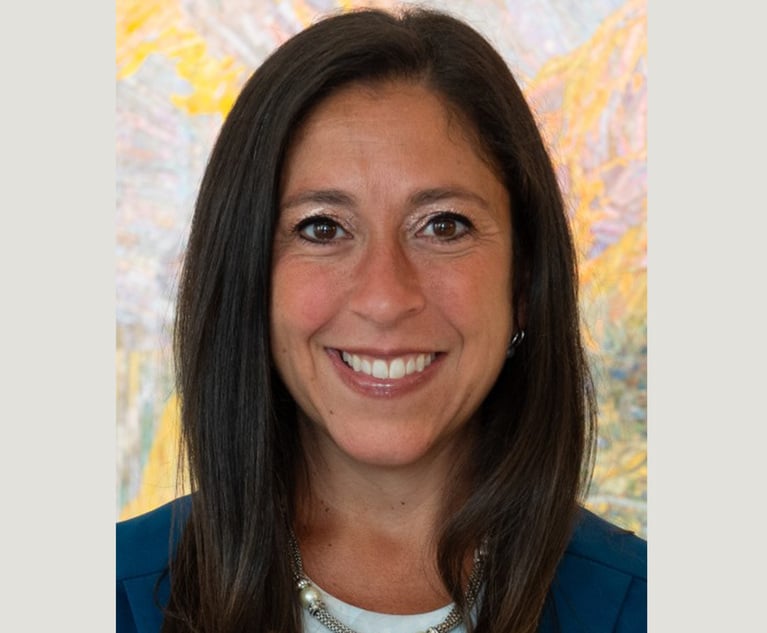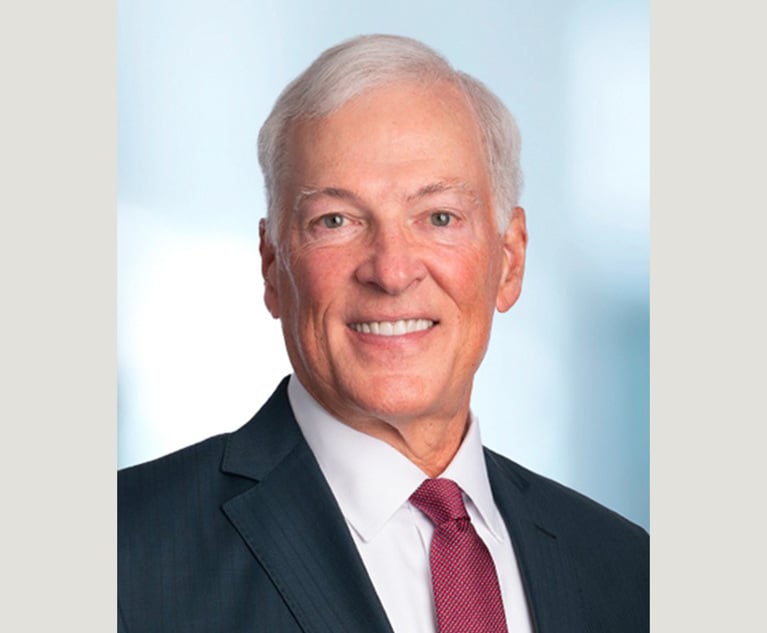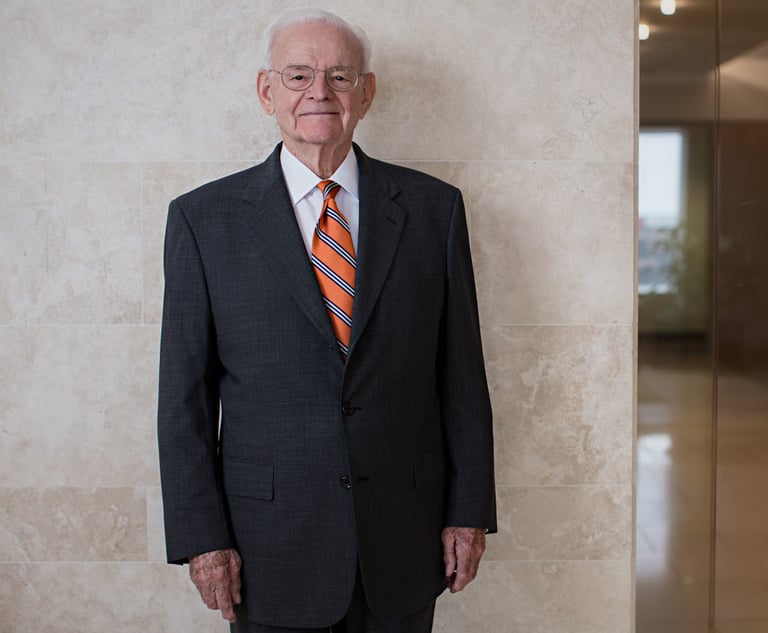 Jennifer Coatsworth of Philadelphia Bar Association. Courtesy photo
Jennifer Coatsworth of Philadelphia Bar Association. Courtesy photoA New State Law Is a Positive Step Forward for Judicial Security in Pennsylvania—But More Action Is Needed
In recent years, there has been an alarming surge in threats against public officials. During Congressional testimony in February, officials with the U.S. Marshal Service, which is tasked with protecting more than 2,700 federal judges, said threats against that group have more than doubled in the past three years.
November 14, 2024 at 12:01 PM
5 minute read
Trust in the justice system, faith in the lawyers and judges who toil in that system, and even confidence in jurors has begun to erode. It is certainly acceptable to disagree with a ruling or a verdict, or even question whether the judge was fully prepared. However, old lines of propriety are being trampled and new dangerous lines are being drawn. When an unfavorable ruling occurs, it now seems acceptable to spout, without any basis, that the judge was “on the take” or “corrupt,” or even to question the integrity of a jury. Even more troubling is the fact that some members of the public seem to be listening to and accepting this distorted rhetoric.
In recent years, there has been an alarming surge in threats against public officials. During Congressional testimony in February, officials with the U.S. Marshal Service, which is tasked with protecting more than 2,700 federal judges, said threats against that group have more than doubled in the past three years. Data from the Marshals Service also shows the annual average number of threats against federal court personnel was 1,180 incidents in the decade prior to 2015 and 3,810 in the nearly 10 years since then, Reuters reports.
The increases have come at a time when overall public trust in government institutions has waned. According to a report released by the Annenberg Public Policy Center at the University of Pennsylvania in June, the percentage of Americans who expressed either “a great deal” or a “fair amount” of trust in the judicial branch has fallen dramatically, from 75% in 2000 to under 50% in 2022.
In just the past few weeks, a Kentucky judge was killed by the county sheriff who oversaw courtroom security; a bomb went off at a courthouse in California, injuring five people, in what the FBI has said was an attempt to kill a judge, and an Alaska man was arrested for allegedly threatening to kill the justices on the U.S. Supreme Court. Many will also recall a story from early this year of a man who lunged across the bench at a judge who sentenced him to prison, which made the national news. Also recently, an article in the Philadelphia Inquirer detailed increasing security concerns at Philadelphia’s Family Court, placing both judges and litigants in danger. That article highlighted the fact that judges are not the only victims of the increased violence that surrounds our judicial system. In fact, last year, former Philadelphia Bar Association Chancellor Gaetan Alfano was attacked by a litigant who was involved in a case he was handling.
While our system of justice is not perfect, the due process offered to litigants is second to none. I recently asked the chief judge of the Eastern District of Pennsylvania, Mitch Goldberg, how increased threats against the judiciary are affecting him and his colleagues. He responded: “The current atmosphere, where threats against judges are on the rise, is always in the back your mind. This is not a comfortable place to be. Threats and violence against judges’ families have been particularly concerning. We recently had a very violent pro se litigant place the assigned judge’s name and home address on the internet. Unfortunately, some outstanding lawyers who may aspire to be judges, have shied away from pursuing that goal as they don’t want to place themselves or their families in harm’s way.”
Preserving respect for the rule of law is core to the Philadelphia Bar Association’s mission, so we have made this initiative a focal point of our work. That’s why we advocated for the passage of Pennsylvania House Bill 1700, which expands the definition of “public safety official” requiring protection to include “federal judicial officers,” with a definition of that term. The legislation was signed by Gov. Josh Shapiro on Oct. 16 and takes effect in December.
But we are realistic enough to know that one piece of legislation will not solve this problem. Judicial security is a multipronged issue: it is related to cybersecurity, the ease of finding information about individuals online, gun control, mental health, and our increasingly fractured political environment, to name just a few. In Pennsylvania, it’s complicated by the fact that state judges are also elected officials, and some of their information is public record by law.
In Philadelphia and statewide, it’s crucial that we continue to have productive conversations about what it will take to provide better protection in our federal, state and local courthouses for litigants, attorneys, and members of the judiciary. As an organization that represents legal professionals and judges from Philadelphia and the surrounding community, we are hoping to convene a group of stakeholders to talk more about the problem and possible creative solutions for addressing its various aspects.
An independent judiciary is crucial to a functioning justice system. For judges to remain independent in their decision-making, they must be able to do their work free from fear.
Jen Coatsworth is 2024 Chancellor of the Philadelphia Bar Association. She is a partner with Margolis Edelstein.
NOT FOR REPRINT
© 2025 ALM Global, LLC, All Rights Reserved. Request academic re-use from www.copyright.com. All other uses, submit a request to [email protected]. For more information visit Asset & Logo Licensing.
You Might Like
View All
Superior Court Directs Western Pa. Judge to Recuse From Case Over Business Ties to Defendant
3 minute read
Saxton & Stump Lands Newly Retired Ex-Chief Judge From Middle District of Pa.
3 minute read
'Discordant Dots': Why Phila. Zantac Judge Rejected Bid for His Recusal
3 minute read
Judge Louis C. Bechtle: An American Jurist Who Relied on Common Sense, Sound Judgment and Fairness
5 minute readTrending Stories
- 1Am Law 100 Lateral Partner Hiring Rose in 2024: Report
- 2The Importance of Federal Rule of Evidence 502 and Its Impact on Privilege
- 3What’s at Stake in Supreme Court Case Over Religious Charter School?
- 4People in the News—Jan. 30, 2025—Rubin Glickman, Goldberg Segalla
- 5Georgia Republicans Push to Limit Lawsuits. But Would That Keep Insurance Rates From Rising?
Who Got The Work
J. Brugh Lower of Gibbons has entered an appearance for industrial equipment supplier Devco Corporation in a pending trademark infringement lawsuit. The suit, accusing the defendant of selling knock-off Graco products, was filed Dec. 18 in New Jersey District Court by Rivkin Radler on behalf of Graco Inc. and Graco Minnesota. The case, assigned to U.S. District Judge Zahid N. Quraishi, is 3:24-cv-11294, Graco Inc. et al v. Devco Corporation.
Who Got The Work
Rebecca Maller-Stein and Kent A. Yalowitz of Arnold & Porter Kaye Scholer have entered their appearances for Hanaco Venture Capital and its executives, Lior Prosor and David Frankel, in a pending securities lawsuit. The action, filed on Dec. 24 in New York Southern District Court by Zell, Aron & Co. on behalf of Goldeneye Advisors, accuses the defendants of negligently and fraudulently managing the plaintiff's $1 million investment. The case, assigned to U.S. District Judge Vernon S. Broderick, is 1:24-cv-09918, Goldeneye Advisors, LLC v. Hanaco Venture Capital, Ltd. et al.
Who Got The Work
Attorneys from A&O Shearman has stepped in as defense counsel for Toronto-Dominion Bank and other defendants in a pending securities class action. The suit, filed Dec. 11 in New York Southern District Court by Bleichmar Fonti & Auld, accuses the defendants of concealing the bank's 'pervasive' deficiencies in regards to its compliance with the Bank Secrecy Act and the quality of its anti-money laundering controls. The case, assigned to U.S. District Judge Arun Subramanian, is 1:24-cv-09445, Gonzalez v. The Toronto-Dominion Bank et al.
Who Got The Work
Crown Castle International, a Pennsylvania company providing shared communications infrastructure, has turned to Luke D. Wolf of Gordon Rees Scully Mansukhani to fend off a pending breach-of-contract lawsuit. The court action, filed Nov. 25 in Michigan Eastern District Court by Hooper Hathaway PC on behalf of The Town Residences LLC, accuses Crown Castle of failing to transfer approximately $30,000 in utility payments from T-Mobile in breach of a roof-top lease and assignment agreement. The case, assigned to U.S. District Judge Susan K. Declercq, is 2:24-cv-13131, The Town Residences LLC v. T-Mobile US, Inc. et al.
Who Got The Work
Wilfred P. Coronato and Daniel M. Schwartz of McCarter & English have stepped in as defense counsel to Electrolux Home Products Inc. in a pending product liability lawsuit. The court action, filed Nov. 26 in New York Eastern District Court by Poulos Lopiccolo PC and Nagel Rice LLP on behalf of David Stern, alleges that the defendant's refrigerators’ drawers and shelving repeatedly break and fall apart within months after purchase. The case, assigned to U.S. District Judge Joan M. Azrack, is 2:24-cv-08204, Stern v. Electrolux Home Products, Inc.
Featured Firms
Law Offices of Gary Martin Hays & Associates, P.C.
(470) 294-1674
Law Offices of Mark E. Salomone
(857) 444-6468
Smith & Hassler
(713) 739-1250





